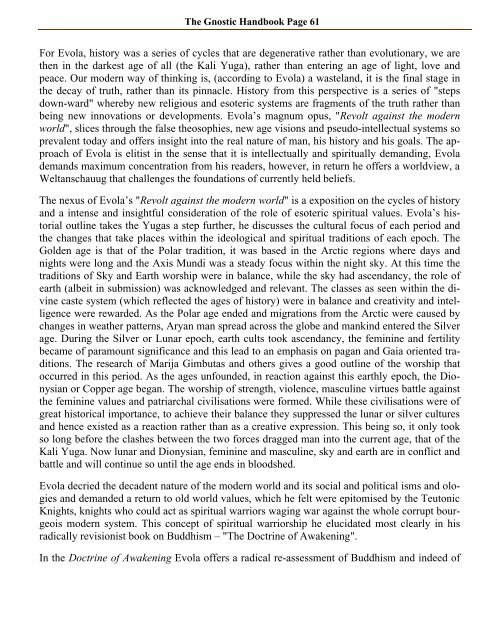gnostic handbook
gnostic handbook
gnostic handbook
You also want an ePaper? Increase the reach of your titles
YUMPU automatically turns print PDFs into web optimized ePapers that Google loves.
The Gnostic Handbook Page 61<br />
For Evola, history was a series of cycles that are degenerative rather than evolutionary, we are<br />
then in the darkest age of all (the Kali Yuga), rather than entering an age of light, love and<br />
peace. Our modern way of thinking is, (according to Evola) a wasteland, it is the final stage in<br />
the decay of truth, rather than its pinnacle. History from this perspective is a series of "steps<br />
down-ward" whereby new religious and esoteric systems are fragments of the truth rather than<br />
being new innovations or developments. Evola’s magnum opus, "Revolt against the modern<br />
world", slices through the false theosophies, new age visions and pseudo-intellectual systems so<br />
prevalent today and offers insight into the real nature of man, his history and his goals. The approach<br />
of Evola is elitist in the sense that it is intellectually and spiritually demanding, Evola<br />
demands maximum concentration from his readers, however, in return he offers a worldview, a<br />
Weltanschauug that challenges the foundations of currently held beliefs.<br />
The nexus of Evola’s "Revolt against the modern world" is a exposition on the cycles of history<br />
and a intense and insightful consideration of the role of esoteric spiritual values. Evola’s historial<br />
outline takes the Yugas a step further, he discusses the cultural focus of each period and<br />
the changes that take places within the ideological and spiritual traditions of each epoch. The<br />
Golden age is that of the Polar tradition, it was based in the Arctic regions where days and<br />
nights were long and the Axis Mundi was a steady focus within the night sky. At this time the<br />
traditions of Sky and Earth worship were in balance, while the sky had ascendancy, the role of<br />
earth (albeit in submission) was acknowledged and relevant. The classes as seen within the divine<br />
caste system (which reflected the ages of history) were in balance and creativity and intelligence<br />
were rewarded. As the Polar age ended and migrations from the Arctic were caused by<br />
changes in weather patterns, Aryan man spread across the globe and mankind entered the Silver<br />
age. During the Silver or Lunar epoch, earth cults took ascendancy, the feminine and fertility<br />
became of paramount significance and this lead to an emphasis on pagan and Gaia oriented traditions.<br />
The research of Marija Gimbutas and others gives a good outline of the worship that<br />
occurred in this period. As the ages unfounded, in reaction against this earthly epoch, the Dionysian<br />
or Copper age began. The worship of strength, violence, masculine virtues battle against<br />
the feminine values and patriarchal civilisations were formed. While these civilisations were of<br />
great historical importance, to achieve their balance they suppressed the lunar or silver cultures<br />
and hence existed as a reaction rather than as a creative expression. This being so, it only took<br />
so long before the clashes between the two forces dragged man into the current age, that of the<br />
Kali Yuga. Now lunar and Dionysian, feminine and masculine, sky and earth are in conflict and<br />
battle and will continue so until the age ends in bloodshed.<br />
Evola decried the decadent nature of the modern world and its social and political isms and ologies<br />
and demanded a return to old world values, which he felt were epitomised by the Teutonic<br />
Knights, knights who could act as spiritual warriors waging war against the whole corrupt bourgeois<br />
modern system. This concept of spiritual warriorship he elucidated most clearly in his<br />
radically revisionist book on Buddhism – "The Doctrine of Awakening".<br />
In the Doctrine of Awakening Evola offers a radical re-assessment of Buddhism and indeed of


